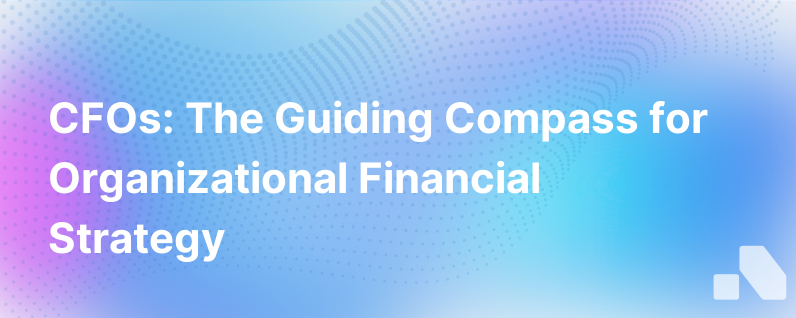The Cfo As The Financial True North Of An Organization
Published on November 22, 2023 by Sawyer Middeleer
In the ever-evolving constellation of corporate leadership roles, the Chief Financial Officer (CFO) has emerged as a pivotal point of navigational certainty—the Financial True North—of modern organizations. In a historical context, the CFO's role primarily focused on bookkeeping, financial reporting, and statutory compliance. However, as economic landscapes have transformed dramatically with global interconnectedness and a relentless pace of change, the CFO’s remit has expanded exponentially.
The contemporary CFO now wears multiple hats, serving as a strategic partner to the CEO, a steward of shareholder value, a risk manager, an operational efficiency expert, and a leader in digital transformation projects. Let's embark on a comprehensive exploration of the multi-faceted role of the CFO as the financial compass for today's organizations.
The Multidimensional Mandate of the Contemporary CFO
Strategic Partner to the CEO
The CFO acts as a chief confidante to the CEO, participating in setting the organization's strategic direction. They are responsible for aligning the financial strategy with overall company goals, ensuring that financial planning reflects the future vision of the company. The CFO aids CEOs by providing insights drawn from financial data that inform important strategic decisions.
Steward of Value
In the quest to create and sustain shareholder value, the CFO is at the helm, navigating through financial complexities. This involves everything from capital structure optimization, investment decision-making, and performance management to investor relations. It's the CFO's mastery of this stewardship that reassures investors and stakeholders of the organization's commitment to value creation and fiscal responsibility.
Guardian of Fiscal Integrity
The CFO is entrusted with the integrity of the financial reporting process. In this capacity, they ensure that the company's financial statements reflect its economic reality, compliant with accounting standards and regulations. Their role in financial governance is critical to garner trust and credibility with external stakeholders.
Architect of Performance
Business performance management is another crucial area led by the CFO. By setting KPIs, monitoring corporate performance, and benchmarking it against industry standards, CFOs identify performance gaps and areas for improvement. The CFO also champions cost management initiatives and aims to improve profitability and operational efficiency.
Conductor of Risk Management
Risk assessment and mitigation are core to the CFO's role. From financial risks like currency fluctuations and interest rate volatility to operational risks such as supply chain disruptions, the CFO's insight is vital in developing strategies to manage and minimize potential threats to the organization's financial health.
Leader in Digital and Technological Innovation
In today's digital world, CFOs also lead innovation in financial systems and processes. Their push for adopting advanced analytics, AI, and machine learning tools to drive financial planning and forecasting marks an exciting frontier for corporate finance functions.
Communicator
An often-underappreciated aspect of the CFO's role is their responsibility for clear communication with stakeholders, which includes employees, boards, investors, and regulators. Their ability to articulate the company's financial trajectory and rationale behind strategic decisions is fundamental to their function.
The Evolving Profile of a Successful CFO
Given the vast and complex responsibilities of a CFO, certain characteristics and skills are critical for success in this role:
- Strategic Foresight: The capacity to foresee industry trends and position the company to leverage upcoming opportunities or mitigate emerging risks is invaluable.
- Financial Acumen: Profound knowledge of finance, accounting, and economics is a given, but it's the application of this expertise to drive strategy that sets apart top-tier CFOs.
- Leadership: Being able to inspire and lead a team across various departments, instilling a culture of financial awareness and discipline, is essential.
- Communication Skills: The ability to convey complex financial concepts to non-finance personnel and to articulate the company's financial narrative is indispensable.
- Analytical and Problem-Solving Skills: The capability to dissect large sets of data and glean insights that inform business decisions is crucial.
- Tech-Savviness: A strong understanding of digital tools and how they can be used to enhance financial functions is increasingly important.
Navigating Into the Future
As organizations continue to traverse through uncertain economic terrains and grapple with the rapid pace of change, the CFO's compass will be indispensable in guiding them towards stability and growth. The foremost CFOs will balance short-term realities with long-term strategic planning, remaining adaptable and resilient, and lead their companies towards profitable horizons.
In this role, they must synthesize vast amounts of disparate data, stay abreast of technological advancements, and communicate fluidly with both internal and external audiences. The CFO is much more than a guardian of the books—they are a forward-thinking architect of the company's financial foundation and a trusted advisor in the executive suite.
Embracing this multi-faceted responsibility, the CFO ensures that financial clarity, operational excellence, and strategic vision remain inextricable from an organization's journey. As businesses seek paths to sustainable growth, the demand for CFOs, who can serve as their Financial True North, will only continue to rise.
In conclusion, the CFO's influence extends far beyond the ledger. They are critical in setting ethical standards, fostering a culture of accountability, and ensuring the financial vitality of the enterprise. The CFO does not merely report on the organization's financial health; they are a vital agent in securing and enhancing it, the embodiment of fiscal navigation that steers the corporate ship towards prosperity.